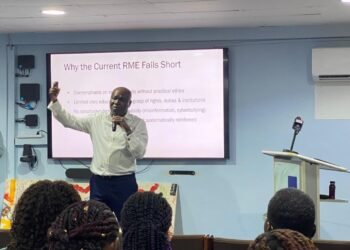The Minority Leader and Member of Parliament for Effutu, Hon. Alexander Kwamena Afenyo-Markin, has warned that Ghana’s democracy risks erosion if citizens and leaders fail to embrace accountability, discipline, and collective responsibility.
Speaking at a public lecture organized by the Ghana Center for Democratic Development (CDD-Ghana) under the theme “Beyond the Text: Making Ghana’s Constitution Deliver Democracy”, he stressed that political apathy, cultural disconnection, and cyclical acts of revenge politics are undermining the country’s democratic fabric.
According to him, a culture of impunity has taken root, with both citizens and political leaders complicit in weakening the very institutions designed to protect democracy.
“There seems to be some apathy and a sort of business as usual,” he noted. Ordinary Ghanaians, he argued, believe politicians are only in office to enrich themselves, and in turn, when given opportunities, they also act without accountability. “It becomes survival of the fittest, and that for me is a major concern,” he said.
He traced this pattern to the management of social intervention programmes, beginning with Rawlings’ poverty alleviation initiatives through to the establishment of MASLOC under President Kufuor.
While intended to empower small businesses and individuals, the Minority Leader lamented that these programmes have been reduced to political patronage. Beneficiaries often refuse to repay loans, insisting they supported the party in power.

Attempts at recovery, he explained, are then viewed as betrayal. “We need to do something about it,” he urged, warning that such attitudes cripple economic growth and perpetuate dependency.
Drawing on his own experiences in private business, Hon. Afenyo-Markin recounted efforts to empower people through job creation schemes, such as taxi work-and-pay arrangements.
However, he observed a disturbing trend of irresponsibility and entitlement among some beneficiaries, who default on agreements without consequence. “People don’t have a system in place to make them responsible,” he remarked, adding that the nation’s unemployment crisis will worsen if this culture continues unchecked.
He proposed a “culture of collective responsibility,” where citizens and leaders alike commit to moving the country forward irrespective of political affiliation. Without this shared responsibility, he warned, democratic apathy would deepen, and ordinary people would lose hope in the political system. “If we don’t get that right, everything will come tomorrow the same way, and it gets to the point where everybody will give up,” he cautioned.
The Effutu MP also underscored the role of culture and education in sustaining democracy. He expressed disappointment that many international schools in Ghana fail to teach local languages, a situation he believes distances young people from their roots.
“In the West, they teach their languages, but in our country, children are not taught Ghanaian languages. They don’t even appreciate anything we do,” he observed. The result, he argued, is a generation disconnected from Ghanaian values and more likely to adopt negative stereotypes uncritically.
He illustrated this disconnect with an encounter at the University of Cape Coast, where a final-year student struggled to correctly name the Ministry of Employment, Jobs and Labour Relations.
For him, this was symptomatic of a broader lack of civic education, which diminishes young people’s sense of ownership in governance. “There is no connection, and people feel that they don’t care,” he lamented.

The Minority Leader also criticized the use of political power as a tool for revenge, warning that such practices could destabilize Ghana’s democracy. He recalled efforts in the past to reduce extreme partisan hostility, often through backchannel mediation.
But in his view, the goodwill of the current administration is now being exploited, with justice manipulated to settle political scores. “We are using the power for revenge,” he said, cautioning that young people, already disillusioned with the political elite, could one day reject democracy entirely.
Turning to the recent removal of Chief Justice Gertrude Araba Esaaba Sackey Torkonoo, Hon. Afenyo-Markin raised serious concerns about the process. Although President John Dramani Mahama had referred three petitions to a committee of inquiry, he observed that the committee’s findings addressed only one.
Yet the Chief Justice was removed on the basis of that single report. “If we do not speak up and end some of these tragic mistakes, then should the NPP return to power, extremists will also come and say the person who is Chief Justice should be fired,” he warned.
He urged those in government to “watch some of the excesses,” stressing that past wrongs cannot justify present mistakes. “We must end the cycle of ‘do me, I do you,’” he declared.
As a member of the ECOWAS Parliament, the Effutu lawmaker expressed alarm at the fragility of democracy across West Africa. He cautioned that if Ghana’s leaders continue on the current path, the country could lose its hard-won democratic gains.
“The young ones don’t even trust us as a political elite,” he noted. With the rise of social media amplifying frustrations, he warned that citizens might one day reject democracy outright without considering the consequences.

Despite these concerns, the minority leader insisted that the Minority in Parliament has no intention of obstructing government business. Instead, he pledged constructive collaboration to strengthen governance.
“Ours is not to obstruct. I have been in government, and I know how big a role it makes. My job is to work with the government and be constructive,” he affirmed. He called for unity, urging both government and opposition to safeguard democratic institutions rather than destroy them for short-term political gain.
In closing, the Minority Leader stressed that Ghana’s democracy must go beyond constitutional texts to become a way of life rooted in accountability, cultural identity, and shared responsibility.
“Let’s not think of destroying ourselves and breaking down institutions all for political convenience. It’s not going to help,” he concluded, urging all stakeholders to recommit to the democratic project.
READ ALSO: Ghana to Deploy Solar-Powered Irrigation Pumps to Boost Year-Round Farming



















